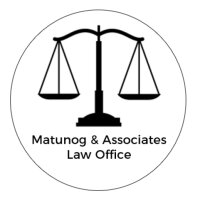Best Renewable & Alternative Energy Lawyers in Davao City
Share your needs with us, get contacted by law firms.
Free. Takes 2 min.
List of the best lawyers in Davao City, Philippines
About Renewable & Alternative Energy Law in Davao City, Philippines
Davao City, situated in one of the fastest growing regions in the Philippines, has increasingly recognized the importance of renewable and alternative energy sources. Renewable and alternative energy law here primarily focuses on the governance, promotion, and regulation of energy that comes from natural resources such as solar, wind, hydroelectric, biomass, and geothermal power. Both national laws and local ordinances aim to promote sustainable energy solutions, support energy independence, and reduce the reliance on fossil fuels. The city is also known for implementing innovative energy programs and public-private partnerships, driven by environmental protection goals and the city’s roadmap for green and resilient urban growth.
Why You May Need a Lawyer
Legal assistance in the realm of renewable and alternative energy in Davao City may become necessary for various reasons. Individuals, businesses, and investors might seek guidance on how to comply with government regulations when developing, installing, or operating renewable energy systems. Common situations include:
- Securing permits for renewable energy projects such as solar panels, wind turbines, or biomass facilities
- Navigating complex licensing requirements and obtaining Environmental Compliance Certificates (ECC)
- Understanding incentives and the application process for government grants or subsidies
- Negotiating power purchase agreements (PPA) with utility companies or local governments
- Resolving property disputes related to access, land use, and easements for energy projects
- Complying with environmental impact assessments, building codes, and zoning laws
- Settling contractual disagreements between developers, contractors, suppliers, and other stakeholders
- Ensuring intellectual property rights for innovative renewable energy technologies
- Addressing tax implications and securing tax incentives for renewable energy investments
Local Laws Overview
Renewable and alternative energy development in Davao City is governed by both national legislation and local ordinances. The Philippines Renewable Energy Act of 2008 (Republic Act No. 9513) is the primary national law that provides for the development, utilization, and promotion of renewable energy resources. This law establishes incentives for developers, requires net metering, and governs the entry of renewable energy into the national grid.
Locally, the Davao City government supports energy transition efforts through policies promoting investment, fast-tracking permitting, and implementing “green” building ordinances. Environmental laws, such as those concerning land use, zoning, and environmental impact assessments, are rigorously enforced in Davao City. The city’s Renewable Energy Ordinance also sets out local guidelines for energy project deployment and outlines community participation protocols. Additionally, safety standards, grid connection requirements, and local sustainability plans may affect both small-scale and commercial renewable initiatives.
Frequently Asked Questions
What are the most common types of renewable energy projects in Davao City?
The most common renewable energy projects in Davao City are solar rooftop installations, small hydroelectric plants, biomass facilities converting agricultural residue, and pilot wind energy projects.
Do I need a permit to install solar panels on my home or business?
Yes, most installations require permits from the Davao City government, particularly the Office of the Building Official, and may need clearances from the Department of Energy and utility providers for grid connection.
Are there incentives or subsidies for switching to renewable energy in Davao City?
The national Renewable Energy Act provides incentives including income tax holidays, duty-free importation of equipment, and a feed-in tariff system. Davao City also has programs supporting community-based renewable energy deployments.
What is net metering and how does it work in Davao City?
Net metering lets you sell excess power generated by, for example, solar panels, back to the grid. Electric utilities, including Davao Light and Power Company, are required to facilitate net metering under national law.
Do I need an environmental impact assessment for a renewable energy project?
Projects of a certain size or with potential environmental impact require an Environmental Impact Assessment and subsequently, an Environmental Compliance Certificate from the Department of Environment and Natural Resources.
Can foreign investors participate in renewable energy projects in Davao City?
Yes, foreign investors can participate under specific conditions and ownership limitations set by national law, but local joint ventures are commonly used to meet land ownership requirements.
What are the penalties for non-compliance with renewable energy regulations?
Penalties vary, but can include fines, project stoppage, and in serious cases, criminal charges for violating environmental or zoning laws.
How long does it take to secure the required permits for a renewable energy project?
Timelines vary based on project scope, but smaller projects may secure all permits within a few weeks, while larger or more complex initiatives can take several months due to the need for multiple agency approvals.
Do homeowners’ associations have a say in rooftop solar installations?
Yes, many homeowners’ associations in Davao City have covenants or restrictions that can affect the installation of solar panels or other visible renewable energy systems.
Where can I file a complaint about renewable energy related disputes or violations?
Complaints can be filed with local government offices, the Department of Energy, or specialized agencies like the Energy Regulatory Commission, depending on the nature of the dispute.
Additional Resources
For more information and assistance, consider the following resources:
- Department of Energy (DOE) Mindanao Field Office
- Davao City Investment Promotion Center (DCIPC)
- Department of Environment and Natural Resources (DENR) Region XI
- Davao Light and Power Company for utility concerns and net metering
- Philippine Green Building Council for sustainable building guidance
- Davao City Environment and Natural Resources Office (CENRO)
- Energy Regulatory Commission (ERC)
- Local legal aid clinics and the Integrated Bar of the Philippines - Davao Chapter
Next Steps
If you are considering a renewable energy project or have encountered a legal issue related to alternative energy in Davao City, it is important to consult a lawyer experienced in energy law. Start by outlining your objectives and gathering all relevant documents, such as property titles, business permits, and technical plans. Reach out to a local law firm or legal aid group with expertise on renewable and alternative energy. Schedule a consultation to discuss your plans or concerns in detail. Your lawyer will help you understand compliance requirements, represent your interests in negotiations or disputes, and ensure your project moves forward smoothly and legally.
Lawzana helps you find the best lawyers and law firms in Davao City through a curated and pre-screened list of qualified legal professionals. Our platform offers rankings and detailed profiles of attorneys and law firms, allowing you to compare based on practice areas, including Renewable & Alternative Energy, experience, and client feedback.
Each profile includes a description of the firm's areas of practice, client reviews, team members and partners, year of establishment, spoken languages, office locations, contact information, social media presence, and any published articles or resources. Most firms on our platform speak English and are experienced in both local and international legal matters.
Get a quote from top-rated law firms in Davao City, Philippines — quickly, securely, and without unnecessary hassle.
Disclaimer:
The information provided on this page is for general informational purposes only and does not constitute legal advice. While we strive to ensure the accuracy and relevance of the content, legal information may change over time, and interpretations of the law can vary. You should always consult with a qualified legal professional for advice specific to your situation.
We disclaim all liability for actions taken or not taken based on the content of this page. If you believe any information is incorrect or outdated, please contact us, and we will review and update it where appropriate.









